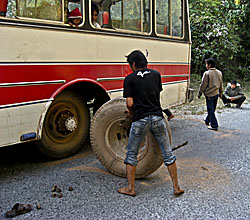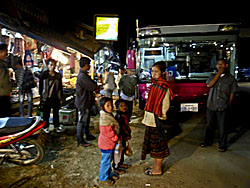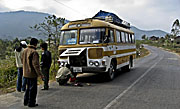Travelling in Laos
To make it short, travelling in Laos is a punishment. A sheer punishment. But, why is that so?
First, the roads are bad. The roads are old, most of them are still unpaved. The state is improving it's roadnets, but progress is slow. At least there are meanwhile a few better sections, but those are also narrow and, particularly in the mountains, serpentines.
Second, the most vehicles are bad. The local busses are even worse than bad - they are a desaster. Old, rotten, dirty, crammed with people and additional bags and animals of all kind - animals, one hasn't seen before. They are treaten bad and suffer a cruel end.
Third, it's slowly. Very slowly. For 150 km one needs several hours, sometimes six hours.

A local bus has a breakdown, this time a puncture, between Xam Neua and Nong Khiaw, Laos. Image: Asienreisender, 2006
Fourth, the vehicles have frequently breakdowns. There is no maintainance on the vehicles, they are just run down and are mend when they fail.
Then it's even quite expensive. If you make up a price-performance-ratio it's costs are comparable to western countries.
using a plane makes you, as a non ASEAN state citizen, paying the double price than locals do. The planes are old and do not even cover western security standards. Western security standards are themselves not really save.
Laos is rich in rivers. Traditionally the rivers are the basic transport net. Using a boat is more expensive than busses are. They are also crammed with people and goods of all sort. And they are even slower than the busses are.
A bus trip from Luang Prabang to Huayxai
At around Christmas 2011 I took the overnight bus from Luang Prabang to Huayxai in the north of Laos. That's some 350 km. It was a VIP bus, supposed to start at 5.30 pm and to arrive twelve hours later in Huayxai.
Being at the bus station some time before the bus leaves is required, even if you have your ticket already. If not, better be early to still get a ticket. Otherwise you don't get a seat or you don't get transport at all.
Then you struggle for your seat. Sometimes the same seat is sold two or more times. People claim your seat theirs, and they are right - but you are too... The bus guard has then to deal with that. By the way, as a foreigner in such a situation you are dealt well with. You can keep your seat and the other applicant is directed to any other place. The people here avoid confrontations. Just keep relaxed in such a situation, as they do as well.
So, you wait already one or two hours before departure time. But departure time means not, that the bus starts. The bus starts, when whatever is done before. That's normally 30 min, 60 min or 90 minutes late. When the bus finally starts, one waits already for some time, maybe two or three hours.
In my case the bus started late, and drove on slowly. Normally bus trips start slowly. Driving slowly on, stopping here, stopping there, stopping again and stopping again, and again, and again, and again. Stopping first at the next petrol station to fill the tank. That's frequently so in Asia. If a bus is full with passengers, they go to the next petrol station. Then picking up more people and other stuff. One could not open the windows, the air conditioner was bad. It was smelling in the bus. From the beginning on no fun factor at all. It got dark.

The VIP bus to Huayxai, standing near a contract restaurant. Image: Asienreisender, 2011
After one hour waisted time in this manner the bus stopped at a contract restaurant. There was plenty of time for everybody to get food before we started, but it means additional business for the driver or the bus company. So we stood there for another 40 min.
The bus driver was a young man in the age of maybe 25 years. He appeared rather than a boy in his expressions. The bus guard was much younger than he. He looked like sixteen. There was also a girl or young woman together with them. I don't know, which role she played. Family member maybe. She was sitting next to the bus driver or lying in a bed behind the driver's seat.
After the time waste at the restaurant we started slowly, stopping here, stopping there, stopping again and stopping again, and again, and again, and again. The driver had to pee, then the guard. People left the bus, looking under the bus. There was a technical problem already when we started, and it was known by the driver and his guard.
The bus continued slowly, sometimes in a speed that one could have walked beside it. Then it stopped. The first breakdown. Half of the people left the bus, watching what's going on and getting some fresh air. The driver tried to solve the problem. For me it was rather difficult to leave, because of all the stuff in the aisle; besides the back door was blocked by four people sitting on the steps and more stuff.
The bus continued as slowly as before, stopping here, stopping there, stopping again and stopping again, and again, and again, and again... The problem wasn't solved. The bus stopped finally. The driver and his guard repaired the wrong thing before. I observe that frequently in Asia. So it didn't take long to the next breakdown.
Meanwhile it was already 1.30 am. This time I became acrobatic and managed to leave the stinking bus. What I saw was the bus driver lying under the bus, working with tools on it. Near to him stood a big thing. It was an air shock absorber. Unusually to have such a special spare part on the bus. They must have known that this kind of breakdown will expect. But they didn't care before. They drive the vehicles until the part breaks finally, and than they act. The procedure took some 90 min. Then the bus driver went back to the wheel, started the bus and made a first try. The right front tyre of the bus was placed on a stone. When the bus went on, the tyre drove from the stone to the ground. The bus was lying very deep, particularly on it's right side. Inclinated. When the bus drove on, the guard was still under the bus. People screamed. Almost a desaster happened. Almost, because no harm was done to the boy. Good luck. Kharma. One needs that here.
All the people entered the bus and it started again. It started slowly, stopping here, stopping there, stopping again and stopping again, and again, and again, and again. But, the bus was over the worst. It pumped air into the shock absorber, the inclination disappeared. The bus could drive.
The road between Luang Prabang and Oudomxay is very bad. Most of the time it's no asphalt road, only a dirt road. Full of potholes and craters. So, the bus went slowly. When we arrived at Oudomxay, it was already 6 am. 30 min after we were supposed to arrive at the destination, Huayxai. But, from Oudomxay to Huayxai it's still a long way. The normal bus needs seven hours for that.
There was no way to sleep on the bus. The seats were small, the neighbour moving all the time, due to the serpentines one was pressed for one or two minutes to the left side, than changing being pressed to the right side. The smell was stronger than before. Sleeping for a few minutes, awaking by a push or any disturbtion, sleeping again, waking up due to a stiff neck... not much of a relexation on this trip. Driving was all the time the same driver. There was no co-driver on the bus. The bus guard was too young to drive.
The speed accelerated and we made some progress. The sun rose, but it was cloudy. Much fog in the mountains. Very impressing. There was some rain these days, not much, but enough to keep the landscapes greener than in other years.
Coming closer to Huayxai the bus stopped here and there, stopping again and stopping again, and again, and again, and again. Dropping people and stuff. Eight kilometers before Huayxai the bus stopped again. People left the bus. I jumped out as well. What was the reason for the final delay? Well, the bus ran out of petrol. Now the bus driver and the bus guard had to arrange petrol supply from the next petrol station. Many people here lack the ability for anticipation. After some time the bus guard came on the back of a motorbike with a tank in his hand. We could make the rest. That were more than 19 hours on the bus.
Most people here take it all easy. Being too angry hurts only oneselve. The people here in Indochina are very patient. Particularly the bus driver and his guard took it easy. They were in best mood all over the time. I wouldn't wonder if they were drugged. "Yabba", a newer designer drug is popular in some circles around in Laos, China, Birma, Thailand. It's said it effects were making users awake, active, stimulated and more creative. One can work under the influence of the drug for many hours, including hard physically work. It's also said it's coming mostly from Burma. The Golden Triangle changed from Opium and Heroin in the 1970s to Amphetamines today.
Well, one can hardly blame the bus driver or even it's younger bus guard. They learned nothing, the social institutions didn't prepare them for life in a modern world.
But there is an appendix. The Huayxai bus station, as many other bus stations in Southeast Asia nowadays, is situated 8 km out of town. So, one needs additional transport to the town. That means another waste of time, bargaining with tuktuk drivers, loading the baggage from the bus to the tuktuk. Then you drive another way down the hills to Huayxai at the river banks of the Mekong River.



